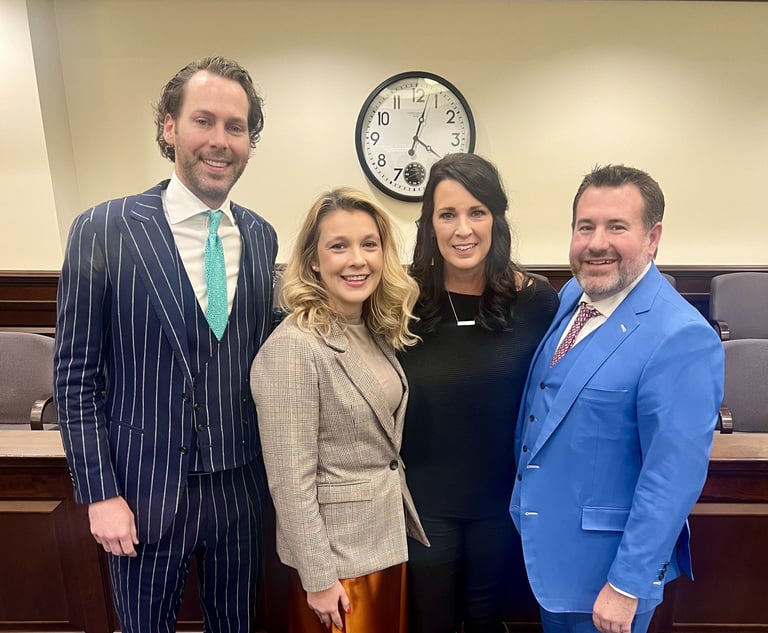Insurer's 'Regular Use' UIM Exclusion Applied to All Fleet Vehicles, Court Rules
A trucker injured in an accident while driving a company truck was precluded from collecting underinsured motorist benefits by his policy's regular use exclusion because the truck was part of his employer's fleet, even though he had previously driven the specific vehicle in question only twice, the Pennsylvania Superior Court ruled.
February 14, 2019 at 03:23 PM
4 minute read
 Photo: Shutterstock
Photo: Shutterstock
A trucker injured in an accident while driving a company truck was precluded from collecting underinsured motorist benefits by his policy's regular use exclusion because the truck was part of his employer's fleet, even though he had previously driven the specific vehicle in question only twice, the Pennsylvania Superior Court ruled.
In a Jan. 31 unpublished memorandum in Mishler v. Erie Insurance, a three-judge panel of the court unanimously upheld a decision by a Somerset County trial judge that defendant Erie Insurance Co. had no duty to pay UIM benefits to plaintiff Mark Mishler.
“The truck at issue was part of Barron Trucking's fleet that was available for Mishler's use at his employment,” Judge Correale Stevens wrote for the panel. “Mishler regularly used a company truck during his employment. The fact that Mishler had only used the particular vehicle involved in the accident on two prior occasions does not affect our conclusion.”
Stevens was joined by Judges Alice Beck Dubow and Jacqueline Shogan.
Mishler was injured when another driver swerved into his lane and caused his truck to overturn, according to Stevens' opinion. After collecting the other driver's full liability coverage of $50,000, as well as $35,000 of UIM coverage from his employer's insurer, Mishler sought additional UIM benefits from Erie, but was denied.
Mishler sought a declaratory judgment from the trial court that he was entitled to UIM benefits and Erie sought a declaratory judgment that it was not required to tender benefits. The trial court sided with Erie, finding that Mishler “regularly and habitually used his employer's trucks to perform his job.” Mishler appealed.
As a threshold matter, the Superior Court first had to determine whether the trial court's ruling was appealable. Erie had argued that the lower court's decision was an interlocutory declaratory judgment order that could not be appealed, but the appeals panel disagreed.
“In this case, the lower court's order granting Erie's motion for judgment on the pleadings did not simply narrow the scope of the litigation, but declared Erie had no duty to tender benefits to Mishler under the policy and fully released Erie from the litigation,” Stevens said, adding, “The lower court's order in this case put Erie out of court by resolving the competing declaratory judgment claims in favor of Erie and essentially finding Mishler did not have any viable theory of recovery against Erie.”
Turning to the merits of the case, Stevens likened the issue to the one resolved in Brink v. Erie Insurance Group, a 2008 case in which the Superior Court ruled that “an employee 'regularly uses' a fleet vehicle if he regularly or habitually has access to vehicles in that fleet[;] [r]egular use of any particular vehicle is not required.”
“In the same manner, we find that the lower court in this case, did not err in finding that the truck Mishler was driving at the time of the accident was excluded from the UIM coverage through his personal automobile policy,” Stevens said.
Counsel for Mishler, Richard Russell of Abood, Russell, Pappas & Rozich in Johnstown, said he believes his client's case is distinguishable from Brink because Mishler did not have regular access to any other vehicles in his company's fleet. Mishler happened to be driving a vehicle other than his regular truck at the time of the accident because his truck was undergoing repairs, according to Russell. While typically, per company policy, a driver whose truck was in the shop would simply not have been able to work until the truck was fixed, in this unusual situation Mishler was given a loaner to drive so that he wouldn't have to miss his shift, Russell said.
Russell said he has filed a motion for reconsideration en banc, arguing that a decision holding that all fleet vehicles are subject to regular use exclusions in insurance policies would run contrary to the Superior Court's own 2010 ruling in Dixon v. Geico, which said a determination as to whether a vehicle was used regularly or occasionally must be made on a case-by-case basis.
Counsel for Erie, Andrew Shannon of Robb Leonard Mulvihill in Pittsburgh, could not be reached for comment.
(Copies of the 13-page opinion in Mishler v. Erie Insurance, PICS No. 19-0192, are available at http://at.law.com/PICS.)
This content has been archived. It is available through our partners, LexisNexis® and Bloomberg Law.
To view this content, please continue to their sites.
Not a Lexis Subscriber?
Subscribe Now
Not a Bloomberg Law Subscriber?
Subscribe Now
NOT FOR REPRINT
© 2025 ALM Global, LLC, All Rights Reserved. Request academic re-use from www.copyright.com. All other uses, submit a request to [email protected]. For more information visit Asset & Logo Licensing.
You Might Like
View All
Philadelphia Eagles 0-2 in Attempts to Recover Insurance on COVID-Related Losses
4 minute read
High Verdicts and Venue Rule Land Pa. Courts on Top of 'Judicial Hellhole' List
5 minute read

Judge Approves $667K Settlement Against Independence Blue Cross for Unpaid, Pre-Shift Computer Work
4 minute readTrending Stories
- 1Trump's Inspectors General Purge Could Make Policy Changes Easier, Observers Say
- 2Supporting Our Supreme Court Justices in the Guardianship Part
- 3'Erroneous Rulings'?: Wilmer Asks 4th Circuit to Overturn Mosby's Criminal Convictions
- 4Judge Orders Acquittal of Ex-Prosecutor on 1 of 2 Counts in Misconduct Trial Over Ahmaud Arbery Case
- 5American Bar Association Calls for Enforceable Supreme Court Ethics Code
Who Got The Work
J. Brugh Lower of Gibbons has entered an appearance for industrial equipment supplier Devco Corporation in a pending trademark infringement lawsuit. The suit, accusing the defendant of selling knock-off Graco products, was filed Dec. 18 in New Jersey District Court by Rivkin Radler on behalf of Graco Inc. and Graco Minnesota. The case, assigned to U.S. District Judge Zahid N. Quraishi, is 3:24-cv-11294, Graco Inc. et al v. Devco Corporation.
Who Got The Work
Rebecca Maller-Stein and Kent A. Yalowitz of Arnold & Porter Kaye Scholer have entered their appearances for Hanaco Venture Capital and its executives, Lior Prosor and David Frankel, in a pending securities lawsuit. The action, filed on Dec. 24 in New York Southern District Court by Zell, Aron & Co. on behalf of Goldeneye Advisors, accuses the defendants of negligently and fraudulently managing the plaintiff's $1 million investment. The case, assigned to U.S. District Judge Vernon S. Broderick, is 1:24-cv-09918, Goldeneye Advisors, LLC v. Hanaco Venture Capital, Ltd. et al.
Who Got The Work
Attorneys from A&O Shearman has stepped in as defense counsel for Toronto-Dominion Bank and other defendants in a pending securities class action. The suit, filed Dec. 11 in New York Southern District Court by Bleichmar Fonti & Auld, accuses the defendants of concealing the bank's 'pervasive' deficiencies in regards to its compliance with the Bank Secrecy Act and the quality of its anti-money laundering controls. The case, assigned to U.S. District Judge Arun Subramanian, is 1:24-cv-09445, Gonzalez v. The Toronto-Dominion Bank et al.
Who Got The Work
Crown Castle International, a Pennsylvania company providing shared communications infrastructure, has turned to Luke D. Wolf of Gordon Rees Scully Mansukhani to fend off a pending breach-of-contract lawsuit. The court action, filed Nov. 25 in Michigan Eastern District Court by Hooper Hathaway PC on behalf of The Town Residences LLC, accuses Crown Castle of failing to transfer approximately $30,000 in utility payments from T-Mobile in breach of a roof-top lease and assignment agreement. The case, assigned to U.S. District Judge Susan K. Declercq, is 2:24-cv-13131, The Town Residences LLC v. T-Mobile US, Inc. et al.
Who Got The Work
Wilfred P. Coronato and Daniel M. Schwartz of McCarter & English have stepped in as defense counsel to Electrolux Home Products Inc. in a pending product liability lawsuit. The court action, filed Nov. 26 in New York Eastern District Court by Poulos Lopiccolo PC and Nagel Rice LLP on behalf of David Stern, alleges that the defendant's refrigerators’ drawers and shelving repeatedly break and fall apart within months after purchase. The case, assigned to U.S. District Judge Joan M. Azrack, is 2:24-cv-08204, Stern v. Electrolux Home Products, Inc.
Featured Firms
Law Offices of Gary Martin Hays & Associates, P.C.
(470) 294-1674
Law Offices of Mark E. Salomone
(857) 444-6468
Smith & Hassler
(713) 739-1250





